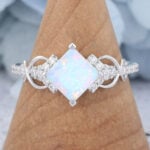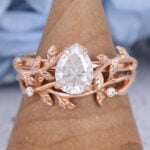IGI vs GIA: Which Diamond Certification Should You Trust?
When comparing diamond certifications, the debate of IGI vs GIA often arises. Understanding their grading standards is key to making a confident, informed jewelry purchase.
What is IGI?
The meaning of IGI is International Gemological Institute, which was founded in 1975 and is one of the world’s leading gem identification and diamond grading organizations. Headquartered in Antwerp, Belgium, IGI has branches in many countries. IGI is favored by many retailers for its efficient services and relatively low certification fees. It mainly provides grading certificates and identification services for diamonds, colored gemstones, pearls and finished jewelry, especially in the field of lab grown diamonds.
What is GIA?
GIA stands for Gemological Institute of America, which was founded in 1931 and is one of the most authoritative and credible gem research and education institutions in the world. The famous 4C standard of diamonds – Cut, Color, Clarity and Carat – was proposed by this organization, which also established a diamond rating system widely adopted by the world. GIA is known for its rigorous, fair and transparent ratings. It is mainly responsible for the certification and grading reports of natural diamonds and is the preferred appraisal institution for high-end jewelry and investment-grade diamonds.
What Is Diamond Certification and Why It Matters?
Diamond certificates, also known as diamond grading reports, are authoritative documents issued by professional gemological institutions (such as the world-renowned GIA and IGI) after scientific testing and evaluation of the quality of diamonds according to international standards. The certificate records in detail the 4C parameters of the diamond – Cut, Color, Clarity, Carat, and other important features such as fluorescence, cutting proportions and shape. Diamond certificates help buyers understand the true quality of diamonds and avoid buying gems that are exaggerated or misleading.
Diamond certificates play a key role in the purchase process. They not only provide authoritative certification for diamond quality, ensuring that the diamonds purchased by consumers are consistent with the merchant’s label, effectively avoiding being cheated, but also help buyers and sellers reach a consensus based on the 4C grade of diamonds, facilitating reasonable pricing and smooth transactions. Diamonds with certificates are more liquid in the secondary market and are also convenient for insurance claims, thereby improving their ability to maintain value. In addition, grading reports from authoritative organizations such as GIA and IGI provide consumers with greater confidence and protection, especially when shopping online or conducting cross-border transactions.
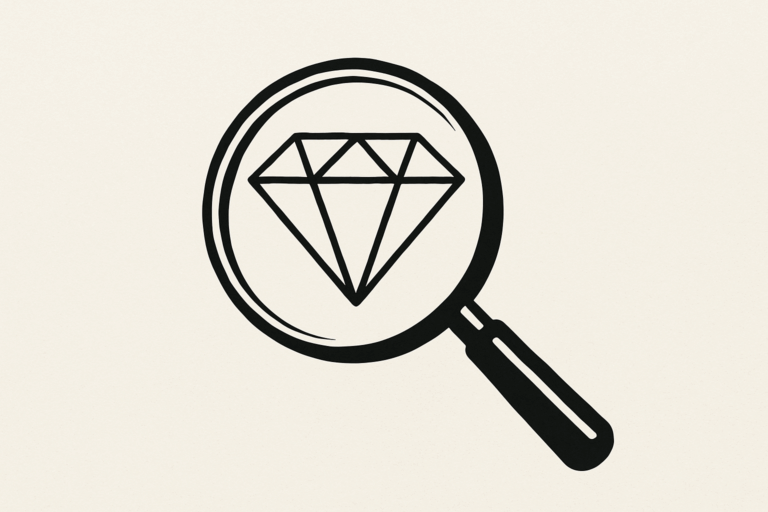
IGI vs GIA: Key Differences
Grading Consistency and Strictness
GIA is known for its rigorous and stable grading standards and is regarded as the “most conservative” rating agency in the industry. For example, in the determination of color and clarity, GIA is often more stringent and has a smaller margin of error. IGI’s rating is relatively loose, especially in the cultured diamond market. Sometimes the color or clarity of the same diamond in IGI’s rating will be half a grade to one grade higher than GIA. Therefore, GIA’s grading is more consistent and predictable, suitable for buyers with higher quality requirements.
Market Perception and Trust
GIA enjoys a high reputation worldwide and is the preferred certification body for many fine jewelry brands, auction houses and investment buyers. GIA certified diamonds represent high quality and integrity and Its certificates are often used in natural diamond transactions. Although IGI is also very active in the global retail market, especially in Asia, Europe and the lab diamond market, its overall market trust is slightly lower than that of GIA.
Turnaround Time and Cost
Due to its strict procedures and comprehensive testing, GIA takes a relatively long time to issue a certificate, and the cost of a GIA grading report is also higher. In contrast, IGI is known for its fast service and lower cost, making the IGI certificate especially suitable for merchants needing bulk certification or consumers who are more time-sensitive. Choosing an IGI certificate allows buyers to receive an authoritative grading report more quickly while saving on certification fees.
Focus Areas
GIA mainly focuses on natural diamonds and gemstones, and its authority in the field of natural diamonds is unmatched. It was not until recent years that GIA began to gradually intervene in the grading of cultured diamonds. IGI invested heavily in the cultured diamond market earlier and is currently one of the most important grading agencies in this field. IGI also accepts more types of overall jewelry certification and has a wider range of services. Therefore, if you are buying natural diamonds, GIA is more reliable; if you are buying lab diamonds or finished jewelry, IGI is more common and practical.
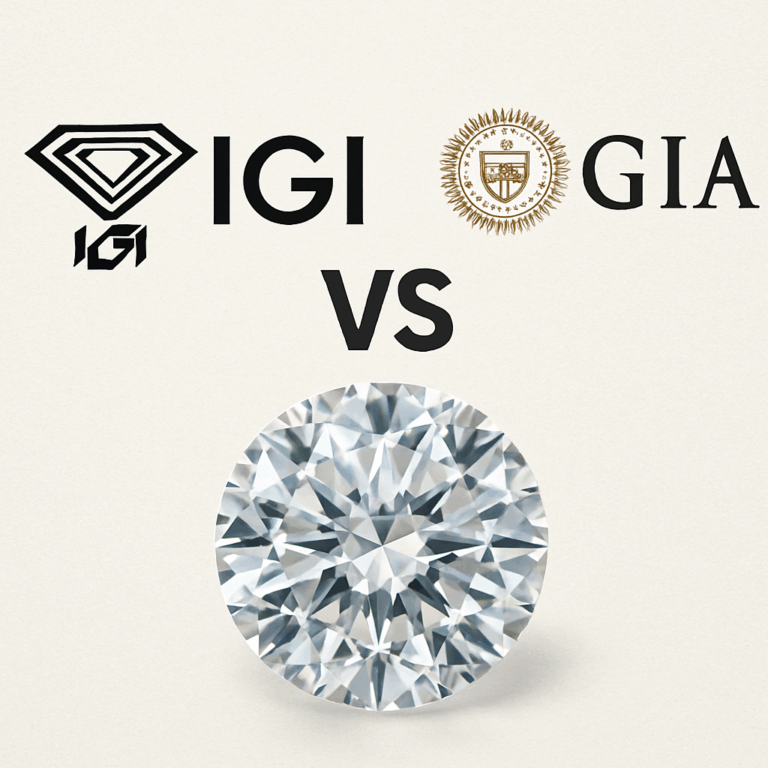
How IGI and GIA Grade Diamonds?
IGI and GIA, two authoritative organizations, will conduct detailed evaluations of diamonds based on the internationally accepted “4C” standards for diamonds, namely Cut, Color, Clarity and Carat.
- Cut: Cut directly affects the brilliance and appearance of diamonds. GIA has very strict requirements for cut, especially in terms of proportion and symmetry. IGI’s standards are relatively loose, and the cut grade is sometimes slightly higher than GIA.
- Color: The color grade reflects the transparency and hue of the diamond. GIA’s color grading system is meticulous and strict, while IGI’s color judgment may be slightly loose, and the grade given will make the diamond look closer to colorless.
- Clarity: Clarity evaluates the number and location of inclusions in the diamond. GIA’s standards are strict, and IGI is sometimes more lenient.
- Carat: Carat is the unit of weight of diamonds. IGI and GIA are basically consistent in measuring carats, with extremely small errors, and are objective data.
IGI vs GIA Certified Diamonds, Which Should You Trust?
GIA’s grading standards are conservative and scientifically rigorous, and it enjoys a high reputation in the natural diamond market and high-end jewelry. GIA Diamond Certification is particularly suitable for consumers who focus on long-term value preservation and investment.
In contrast, IGI has a higher market share in the field of laboratory diamonds, and its grading standards are relatively loose, especially in terms of color and clarity, and the diamond grade is sometimes slightly higher than GIA. Therefore, the price of IGI Diamond Certificate is usually more affordable, suitable for buyers with limited budgets or those who pursue cost-effectiveness.
Resale and Insurance Considerations
The resale and insurance claims of diamonds are both affected by the certification body. GIA certificates are more recognized in the resale market due to their strict standards and high credibility, with more stable prices and more convenient claims. Although IGI certificates are accepted by most insurance companies, they may not be as smooth as GIA in terms of resale and claims, especially for high-value diamonds. When purchasing, you should comprehensively consider the authority of the certificate to ensure future liquidity and rights.
When IGI Might Be the Right Choice?
IGI is ideal for buyers seeking faster certification and lower costs. It’s popular among retailers and those purchasing lab-grown diamonds or smaller stones. If budget and speed matter more than strict grading, choosing an IGI certificate can offer good value without sacrificing basic quality assurance.
When GIA Is Worth the Premium?
GIA is worth the extra cost for those prioritizing accuracy, consistency, and global recognition. Its strict grading standards provide greater confidence, especially for natural diamonds and high-value purchases. Investors and serious buyers often prefer GIA-certified diamonds for their better resale potential and long-term value.
Some Amanda Real Affordable Lab Diamond Ring
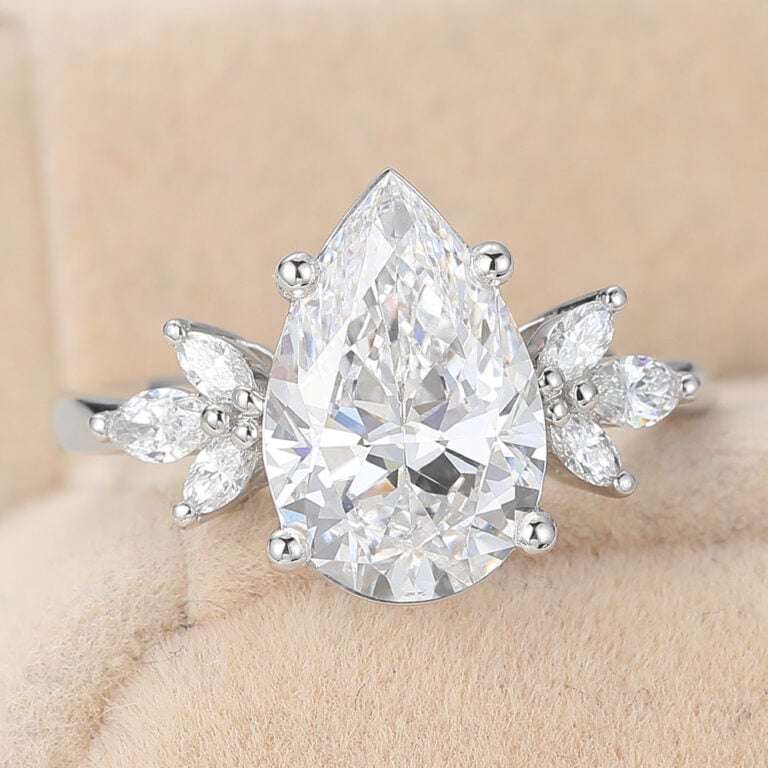
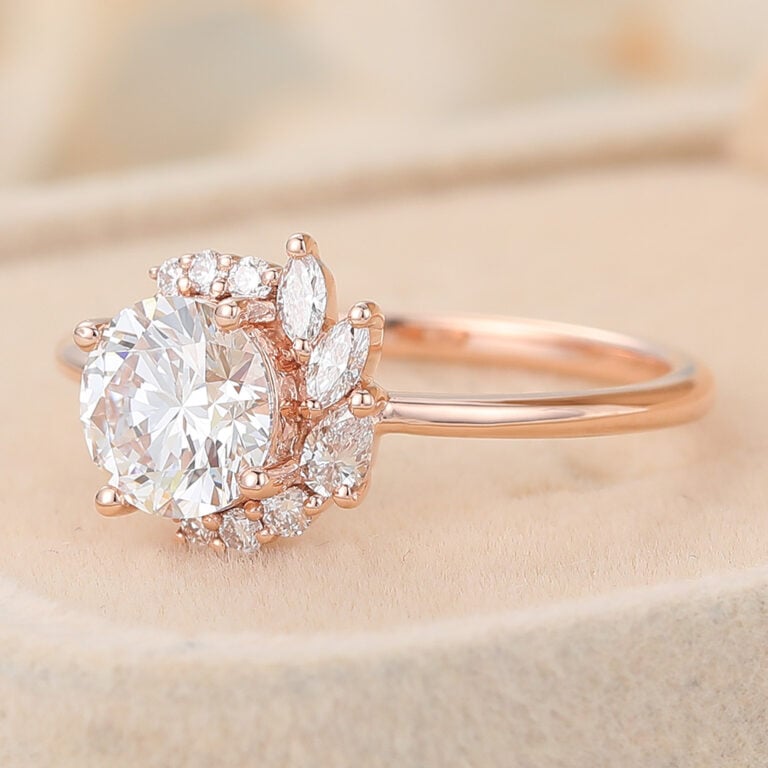
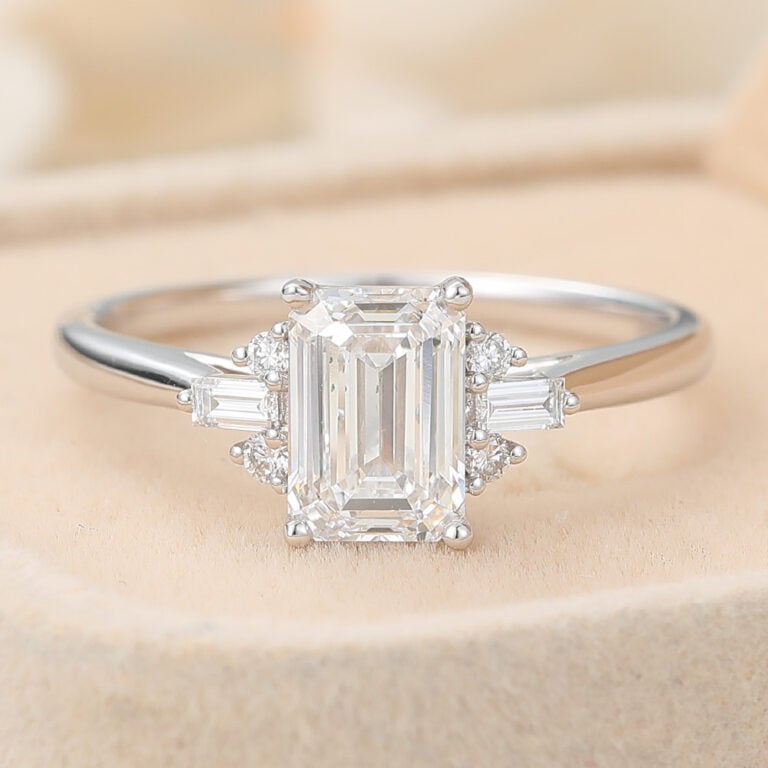
Conclusion: IGI vs GIA – Which One Should You Trust?
When choosing between IGI vs GIA, consider your priorities. GIA offers stricter grading and higher market trust, ideal for investment and natural diamonds. IGI provides faster, more affordable certification, especially for lab-grown stones. Understanding these differences helps you select the certification that best fits your budget and needs.
FAQs About IGI vs GIA
What is a GIA? What is an IGI?
GIA (Gemological Institute of America) and IGI (International Gemological Institute) are leading diamond grading labs. GIA is known for strict, globally trusted certifications, mainly for natural diamonds. IGI provides faster, more affordable grading, especially popular for lab-grown diamonds and retail jewelry.
Is IGI as good as GIA? Is IGI or GIA better?
GIA is generally considered more rigorous and reputable, especially for natural diamonds. IGI is good for budget-conscious buyers or lab-grown diamonds but tends to grade more leniently. Which is better depends on your needs—trust GIA for strictness, IGI for speed and cost.
Is IGI reputable? What is IGI certified diamond? Are IGI diamonds real?
IGI is a reputable global grading lab offering certified diamonds with detailed reports. An IGI certified diamond(IGI diamond appraisal ) is a real, graded stone verified by IGI standards. IGI diamonds are genuine, including both natural and lab-grown stones, widely accepted in the market.
Is GIA certification good? How can i get a diamond GIA certified?
Yes, GIA certification is highly trusted for its strict and accurate diamond grading. To get a diamond certified by GIA, you must send the diamond to an official GIA lab or authorized center for professional evaluation, after which GIA issues a detailed grading report ensuring the diamond’s quality and authenticity.
IGI vs GIA Lab Diamonds, Which Should You Trust?
Both certify lab-grown diamonds, but GIA is known for stricter grading and higher trust. IGI offers faster, affordable certification popular among retailers. For lab diamonds, choose based on your priority—GIA for accuracy, IGI for cost-effectiveness.
Does diamond certification matter?
Yes, diamond certification matters because it provides an objective, trusted assessment of a diamond’s quality, helping buyers verify authenticity, understand value, and make informed purchases with confidence.
How much does a GIA certification cost?
GIA certification costs vary by diamond size and service speed, typically ranging from $100 to $300 or more. The process is slower but offers highly trusted, detailed grading reports.
 Christmas: 25% off All ltems · Code AFJ25 ·Ends Dec 30 30% off All Items ·On Orders Over $600 – Code AMANDA30
Christmas: 25% off All ltems · Code AFJ25 ·Ends Dec 30 30% off All Items ·On Orders Over $600 – Code AMANDA30

